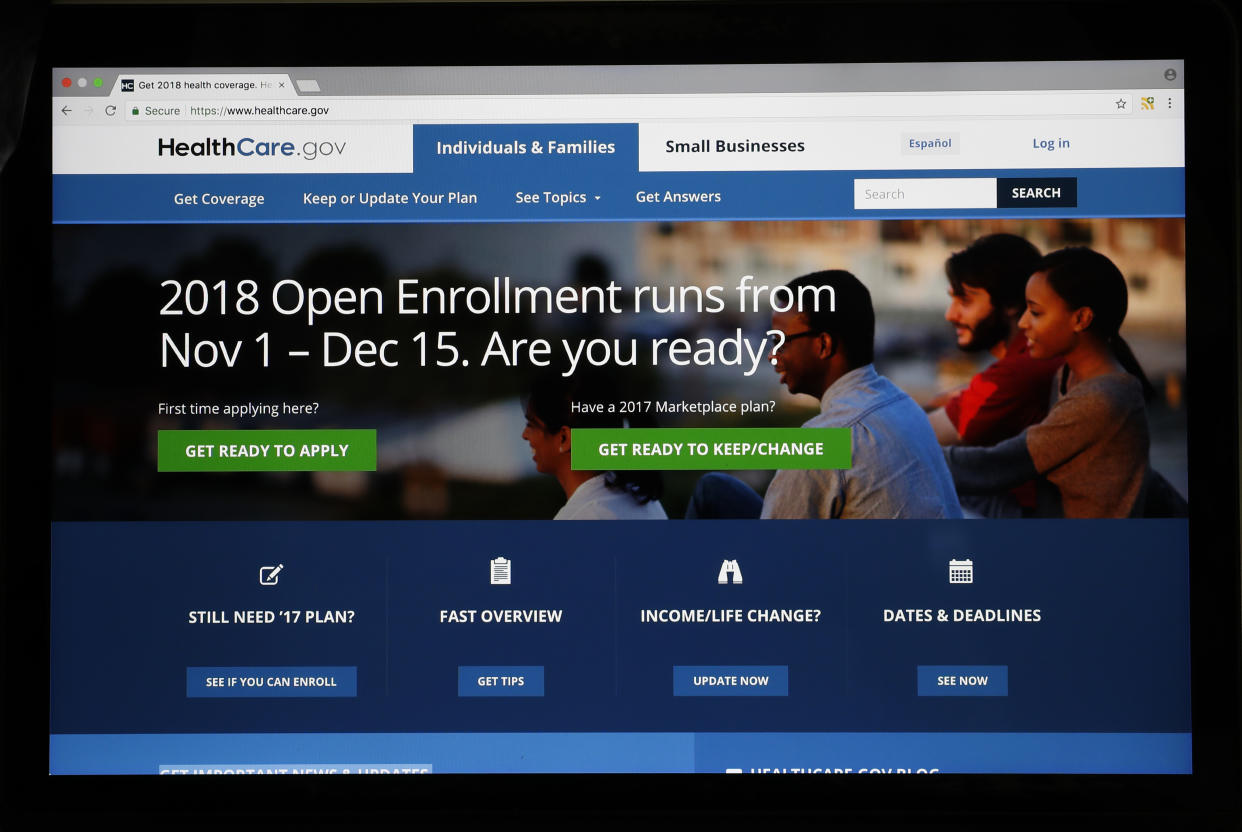Obamacare signups show strong demand — but uncertainty is next

Have questions about open enrollment on the ACA health insurance marketplace? We’re here to help. Submit your questions to MONEYQUESTIONS@YAHOO.COM and they may be answered by our experts in an upcoming Yahoo Finance Facebook Live Chat Tuesday, December 5th, 2017 at 2PM EST.
The U.S. Department of Health and Human Services has released the HealthCare.gov signup numbers, which show strong demand two weeks into the open enrollment period.
In the first 11 days, 1,478,250 people have signed up for a plan, a rate of 134,386 per day. Compared to last year at the equivalent point, signups are up 60% despite advertising cuts and significant uncertainty in the public’s mind regarding Obamacare’s survival.
The high numbers are buoyed by new customers, not just people returning to the exchanges to re-up the previous year’s coverage.
“The strong start to Open Enrollment continues to demonstrate that people want to get covered and stay covered — and that people are finding affordable plans when they shop at HealthCare.gov,” wrote Lori Lodes, the former marketing chief of HealthCare.gov who continues to promote coverage.
A big part of the strong signups is due to the fact that safety-net Bronze Plans are more affordable than ever to those eligible for federal subsidies, which has typically been 80% of Obamacare enrollees.
“The fact that 4.5 million uninsured can find plans with premiums that cost zero dollars each month is likely helping to boost the number of new people who are signing up,” Lodes noted.
Obamacare premium subsidies rose after President Donald Trump decided to cut off cost-sharing reduction payments to insurers, and the hike was more than the cost of Bronze Plans. For many consumers, that means coverage that costs less than the mandate penalty. And as Lodes notes, in some cases it means no-cost insurance coverage.
Uncertainty awaits
Unlike previous years, the open enrollment period is a brief six weeks, ending Dec. 15 for most people, versus Jan. 31. Lodes noted that most people usually sign up at the beginning and end of the enrollment period, hence the big numbers. But with a new end date, things could be different.
“The impact of the Trump’s administration’s decision to significantly cut outreach will primarily be felt in the final weeks of Open Enrollment,” Lodes wrote. “Most paid outreach occurs during this time and this is also when it has the greatest impact. For example, the young and healthy tend to sign up when it’s close to the deadline and need the extra reminders that advertising provides.”
Even if the signup numbers remain strong, the Trump administration and Republican Congress’s push to abolish the individual mandate — which is misunderstood — casts a dark shadow of uncertainty for the law.
If the current tax bill does indeed cut the mandate, insurers will be in a quandary. While the mandate has mixed reviews skewed negative (about 65% disapprove, polls show), it allows insurers to cover those with pre-existing conditions without having to charge extremely high premiums — a popular facet of Obamacare.
Ethan Wolff-Mann is a writer at Yahoo Finance. Follow him on Twitter @ewolffmann. Confidential tip line: emann[at]oath[.com].
Read More:
The phone industry’s clever plan to stop robocalls
Jack Dorsey on bitcoin and cryptocurrency
How cutting the 401(k) limit would affect people’s saving
Former ambassador: Mexico has ‘moved on’ from NAFTA
Vanguard, genocide, and a $18 million campaign to get you to vote
Venmo is one step further to becoming a full-service digital wallet
ATM fees have shot up 55% in the past decade
Big bitcoin-friendly companies like Microsoft and Expedia hedge their bet
The real reason Mexico will never pay for the Trump’s wall: It’d be ‘treason’
How Waffle House’s hurricane response team prepares for disaster
Trump weighs slashing one of the most popular tax deductions

